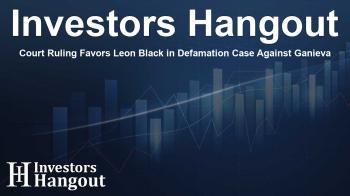Court Ruling Favors Leon Black in Defamation Case Against Ganieva

Leon Black Prevails in Legal Battle
In a significant legal development, billionaire investor Leon Black has received a favorable ruling from a New York state appeals court. The ruling effectively dismissed a defamation claim brought against him by Guzel Ganieva, who had previously accused him of serious allegations, including rape and sexual abuse. This verdict marks a pivotal moment in a case that has garnered considerable media attention and public interest.
The Court's Findings
The Appellate Division in Manhattan made a decisive 4-1 ruling. The court determined that a nondisclosure agreement signed by Ganieva in October 2015 covers all of her allegations against Black. This includes her assertion that Black defamed her by claiming she attempted to extort him. The court's decision suggests a strong emphasis on the implications of contractual agreements in legal disputes, especially concerning allegations of misconduct.
Understanding the Nondisclosure Agreement
According to the court's findings, Ganieva's acceptance of $9 million from Black demonstrates her agreement to the terms outlined in the nondisclosure. The arrangement also included a monthly stipend of $100,000, all of which was received prior to her filing a lawsuit in June 2021. The court argued that accepting these benefits effectively ratified the agreement, limiting her ability to bring forth allegations later, especially after such a substantial financial commitment was made.
Implications of the Ruling
The ruling carries profound implications, particularly in the realm of legal agreements involving allegations of misconduct. While acknowledging the deep trauma often associated with sexual abuse cases, the majority opinion stressed that a plaintiff should not be allowed to repudiate a contract once they have benefited from it for an extended period. The court's decision signals a potential deterrent against future claims that may arise after individuals have already accepted financial settlements.
A Divergent Perspective
The dissenting judge provided a counter-argument, suggesting that Ganieva should be permitted to file her lawsuit based on the premise that she was under persistent duress until March 2021. This standpoint emphasizes the complexity of consent and legal agreements where power dynamics may exist. The dissenting viewpoint sheds light on the necessity of considering individual circumstances in the broader context of contract law.
Leon Black's Response
Throughout the legal proceedings, Leon Black has consistently denied all allegations made by Guzel Ganieva. His steadfast denials underscore an ongoing narrative of contention surrounding high-profile legal battles within the investment community. Black's reputation and business dealings, especially as a co-founder of Apollo Global Management, remain pivotal talking points in discussions about responsibility in financial industries.
This ruling not only reinforces Black's position in this particular case but also raises questions about accountability and the nature of allegations within the context of business dealings. As this case unfolds, the implications for individuals navigating similar situations in high-stakes environments will be closely observed.
Frequently Asked Questions
What was the nature of the allegations against Leon Black?
Leon Black faced allegations from Guzel Ganieva, including claims of rape and extortion. However, he has denied all allegations.
What did the court decide regarding the nondisclosure agreement?
The court ruled that the nondisclosure agreement signed by Ganieva covers all her allegations against Black, dismissing her defamation claims.
What was the financial arrangement between Ganieva and Black?
Guzel Ganieva accepted a total of $9 million, which included a monthly stipend, leading the court to conclude she ratified the nondisclosure agreement.
What implications does this ruling have for future cases?
The ruling may set a precedent about how contractual agreements can limit individuals' abilities to bring forth allegations after accepting settlements.
What were the contrasting opinions in the court's ruling?
The majority of the court emphasized the validity of the nondisclosure agreement, while the dissenting judge argued that Ganieva should still have the right to sue due to ongoing duress.
About Investors Hangout
Investors Hangout is a leading online stock forum for financial discussion and learning, offering a wide range of free tools and resources. It draws in traders of all levels, who exchange market knowledge, investigate trading tactics, and keep an eye on industry developments in real time. Featuring financial articles, stock message boards, quotes, charts, company profiles, and live news updates. Through cooperative learning and a wealth of informational resources, it helps users from novices creating their first portfolios to experts honing their techniques. Join Investors Hangout today: https://investorshangout.com/
Disclaimer: The content of this article is solely for general informational purposes only; it does not represent legal, financial, or investment advice. Investors Hangout does not offer financial advice; the author is not a licensed financial advisor. Consult a qualified advisor before making any financial or investment decisions based on this article. The author's interpretation of publicly available data presented here; as a result, they should not be taken as advice to purchase, sell, or hold any securities mentioned or any other investments. If any of the material offered here is inaccurate, please contact us for corrections.
